« Washington Engineer - May 2006
Computer Science & Engineering’s Susan Eggers elected to National Academy of Engineering
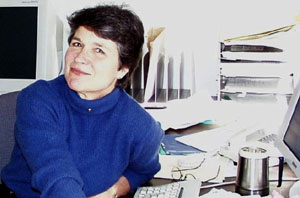
- Susan Eggers is the latest UW faculty member to be inducted into the National Academy of Engineering.
Susan Eggers, a professor in the University of Washington’s Department of Computer Science & Engineering and co-inventor of a revolutionary computer processing technology that changed commercial industry standards, has been elected to the National Academy of Engineering.
She is one of 76 new members and nine foreign associates announced by the academy in February, and is among six active UW faculty who are academy members. In electing her, the academy cited her “contributions to the design and evaluation of advanced processor architectures.”
Eggers, Microsoft Professor of Computer Science & Engineering, achieved what colleagues say is perhaps her greatest accomplishment to date when she teamed up with fellow UW professor Hank Levy and a group of students to invent “simultaneous multithreading” – a way to make more efficient use of a chip’s computing power, boosting computer speeds by as much as 400 percent.
The research has heavily influenced recent microprocessors.
Eggers joined the UW in 1989, after following what she describes as a non-traditional career path. She earned a bachelor’s degree in economics in 1965 from Connecticut College. She worked various jobs, including a stint at Yale University as part of a research team that developed the first automated medical record system that captured medical semantics, and later at Lawrence Berkeley National Laboratory doing computer science research in database management. In 1983, she entered the graduate computer science program at the University of California, Berkeley, graduating with her doctorate in 1989.
Other Stories...
- Four UW engineers made AAAS fellows
- Student team wins regional concrete canoe contest
- Prof gets $6 million to design aircraft energy systems
- Stahl wins Procter & Gamble award
- ME prof gets Gordon Prize
- ACM honors UW computer scientists
- EE student wins Goldwater honorable mention
- EE faculty members win National Academies grants
Four UW engineers honored as American Association for the Advancement of Science fellows
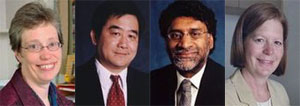
- UW AAAS fellows for 2006, from left: Cynthia Atman, Alex K-Y Jen, Kannan Krishnan and Mary Lidstrom.
Four members of the College of Engineering are among 10 UW profs who were honored as AAAS fellows during the annual meeting of the American Association for the Advancement of Science in St. Louis in February. This year’s fellows from UW Engineering are:
Cynthia Atman, a professor of industrial engineering and director of the Center for Engineering Learning and Teaching and the Center for the Advancement of Engineering Education. She earned her doctorate in engineering and public policy from Carnegie Mellon University and joined the UW in 1998 after seven years on the faculty at the University of Pittsburgh. Her research focuses on engineering design learning, students as emerging engineering professionals and assessment of engineering learning. Atman was cited for outstanding leadership and mentorship in the field of engineering education.
Alex K-Y Jen, the Boeing/Johnson Professor of Materials Science and Engineering, a professor of chemistry and acting chair of the Department of Materials Science and Engineering. He earned a doctoral degree from the University of Pennsylvania in 1984. He joined the UW materials science and engineering faculty in 1999. The focus of his research is the synthesis and characterization of organic functional materials and polymers that possess novel optical, electrical and biological properties. Jen was cited for pioneering contributions to the field of molecular photonics and for the development of novel materials with unprecedented characteristics that have enabled entirely new photonics devices.
Kannan Krishnan, the Campbell Professor of Materials Science and Engineering and an adjunct professor of physics. He earned a doctorate in materials science from the University of California Berkeley in 1984 and joined the faculty at the UW in 2001. The central theme of his research is the systematic exploration and design of fundamental materials’ properties and phenomena as a function of size and dimensionality. Krishnan was cited for establishing fundamental correlations of magnetism, transport, and microstructure in technological materials, for developing novel electron microscopy techniques, and for education of the next generation of materials scientists.
Mary Lidstrom, a professor of chemical engineering and microbiology and holder of the Frank Jungers chair of engineering. She received a doctoral degree in bacteriology from the University of Wisconsin in 1977. Lidstrom came to the UW in 1995. Until recently, she served as associate dean for new initiatives in the College of Engineering. At the end of last year, she became the UW’s new vice provost for research. Her research interests include biomolecular engineering, metabolic engineering and bioremediation. Lidstrom was cited for fundamental applications of genetics and genomics to industrially-important microorganisms and for pioneering development of technology for multiparameter single cell analysis.
AAAS is the world’s largest general scientific society, and publishes the journal Science. Read a news article on all the UW fellows.
Civil & Environmental Engineering students win regional concrete canoe competition
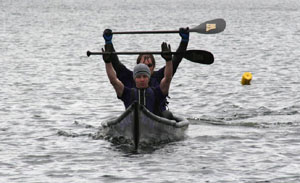
- Husky canoers James Stephens, front, and Greg Cook celebrate after paddling Don’t Panic to victory in the men’s sprint portion of the regional concrete canoe competition in Lacey, Wash., last month. The UW team qualified for the national contest, scheduled for June in Stillwater, Okla.
A team of UW Civil & Environmental Engineeing students won the Pacific Northwest Regional Concrete Canoe Competition last month and qualified for the national contest at Oklahoma State University in June.
The students’ craft, dubbed Don’t Panic in reference to the overriding instruction for an interstellar roadmap in late author Douglas Adam’s “The Hitchhiker's Guide to the Galaxy,” is constructed of a lightweight concrete mix reinforced with Kevlar. The mix uses various additives, including perlite, a volcanic material that “pops” when it’s heated, fly ash, and a latex polymer modifier to reduce cracking.
The mix has a density of 42 pounds per cubic foot, which makes it ligher than water so it will float when completely submerged. That also provided the Hitchhiker’s Guide theme for Don’t Panic. In Adam’s book, the answer to life, the universe and everything was 42. Don’t Panic measures 20 feet, 8 inches and weighs in at under 200 pounds.
The UW group competed with bested 10 other schools in paddling races, a paper on building the canoe, a presentation and judging of the final product. The Huskies won all categories except final product.
UW team members are Jane Anderson, Greg Cook, Kathy Davis, Malena Foster, Amanda Jellin, Joel Kipple, Ngan Ha Nguyen, Tuan Phan, James Stephens, Hilja Welsh, Chris Croft, Kristopher McArthur, Jon Minnick and Candice Au-Yeung. All are civil engineering or pre-civil engineering students. The competition is sponsored by the American Society of Civil Engineers.
Mechanical Engineering’s Taya gets $6 million to design new aircraft energy systems
A University of Washington professor in the Department of Mechanical Engineering has been awarded a $6 million grant under the Multidisciplinary University Research Initiative Program to design new energy collection and storage systems for aircraft.
Minoru Taya and his colleagues will focus on developing new lightweight and durable energy harvesting materials from organics and thermoelectrics, as well as designing energy storage systems using polymers and metal electrodes. Some of the research will be applied to the military’s unmanned air vehicle, which will fly solely on solar energy harvested and stored by systems on the craft.
UW Collaborators on the project include Chunye Xu, Mechanical Engineering; Samuel Jenekhe, Chemical Engineering; Gouzhong Cao, Material Science & Engineering; and Yasuo Kuga, Electrical Engineering. Outside participants include the University of Colorado, the University of California Los Angeles and Virginia Polytechnic Institute. The project is being funded by the Air Force Office of Scientific Research.
Civil & Environmental Engineering’s Stahl wins prestigious Procter & Gamble award
Civil & Environmental Engineering’s David Stahl has been named this year’s recipient of the Procter & Gamble Award in Applied and Environmental Microbiology from the American Society of Microbiology. Stahl’s research group studies the structure and function of microbial communities in a wide variety of habitats, including extreme environments, aquatic systems, microbe-host interactions, and contaminated systems. Read a news story about the award.
ME’s Jorgensen gets Gordon Prize
Jens Jorgensen, emeritus professor in the Department of Mechanical Engineering, has been given one of engineering’s highest honors in the form the 2006 Bernard M. Gordon Prize. Awarded by the National Academy of Engineering, the $500,000 prize recognizes innovation in engineering and technology education. Jorgensen won the prize for his role in creating the Learning Factory, a multidisciplinary forum where student teams work with industry to solve real-world problems. Read a National Academies news release about the award
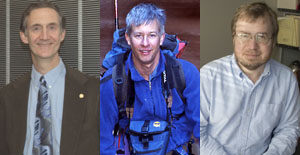
- The Association for Computing Machinery included three UW engineers among honorees for 2005: From the left, Ed Lazowska, Daniel Weld and Tom Anderson.
Three faculty members in Computer Science & Engineering have been honored by the Association for Computing Machinery – two as fellows and one as recipient of a President Award.
Ed Lazowska, the Bill and Melinda Gates Chair and CSE professor, won a 2005 President Award from the Association for Computing Machinery. He is one of only seven people to win this prestigious award since it was started in 1985. Read an ACM news release on the award winners.
At the same time, Tom Anderson and Daniel Weld were inducted into the organization as fellows. Anderson was cited for contributions in distributed systems and computer networks, while Weld was honored for contributions to planning algorithms. See a list of the 2005 ACM fellows.
ACM is the world’s oldest and largest educational and scientific computing society. It serves as a membership of computing professionals and students in more than 100 countries in all areas of industry, academia, and government.
EE student gets Goldwater honorable mention
An undergraduate in the Department of Electrical Engineering is one of four UW students recognized in this year’s round of awards by the Barry M. Goldwater Scholarship and Excellence in Education Program.
Mei Lui was selected as a Goldwater Honorable Mention. Lui would like to improve and advance biological sensors for early medical diagnoses of deadly disease as a physician, scientist and professor in the interdisciplinary field of biomedical engineering. Before the start of her freshman year, she participated in a summer undergraduate research program, working with EE’s John Sahr conducting research on radar remote sensing. Lui is currently studying biophotonics and biological fluid dynamics through the high resolution sorting of cells with different shapes using opto-plasmonic tweezers. She has also studied design learning in the UW’s Center for Engineering Learning and Teaching.
EE faculty members get National Academies grants
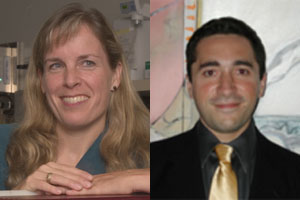
- Electrical engineers Deirdre Meldrum and Babak Parviz
Two UW electrical engineers' research projects are among 14 around the nation awarded 2005 grants under the National Academies Keck Futures Initiative. The grants, each in the amount of $50,000 or $75,000, are to support interdisciplinary research on genomics and infectious disease that might be considered too risky or unusual to attract traditional governmental support.
Deirdre Meldrum was awarded $75,000 for a project that will use state-of-the-art microscale technology to measure and compare cellular events and white blood cell genomic expression in in vitro human models of infection and inflammation. Nitric oxide is an important mediator of white blood cell function in the pathogenesis and host defense of infectious and inflammatory processes.
Babak Parviz was also awarded $75,000 for a project that investigates two nano-scale sensing mechanisms based on tunneling current and surface dipole fields for direct conversion of molecular recognition and binding events to electronic signals. The new sensing mechanisms will provide powerful tools for furthering the understanding of biology at the small scale and extending the link between the genomic information and phenotype and the eventual disease.